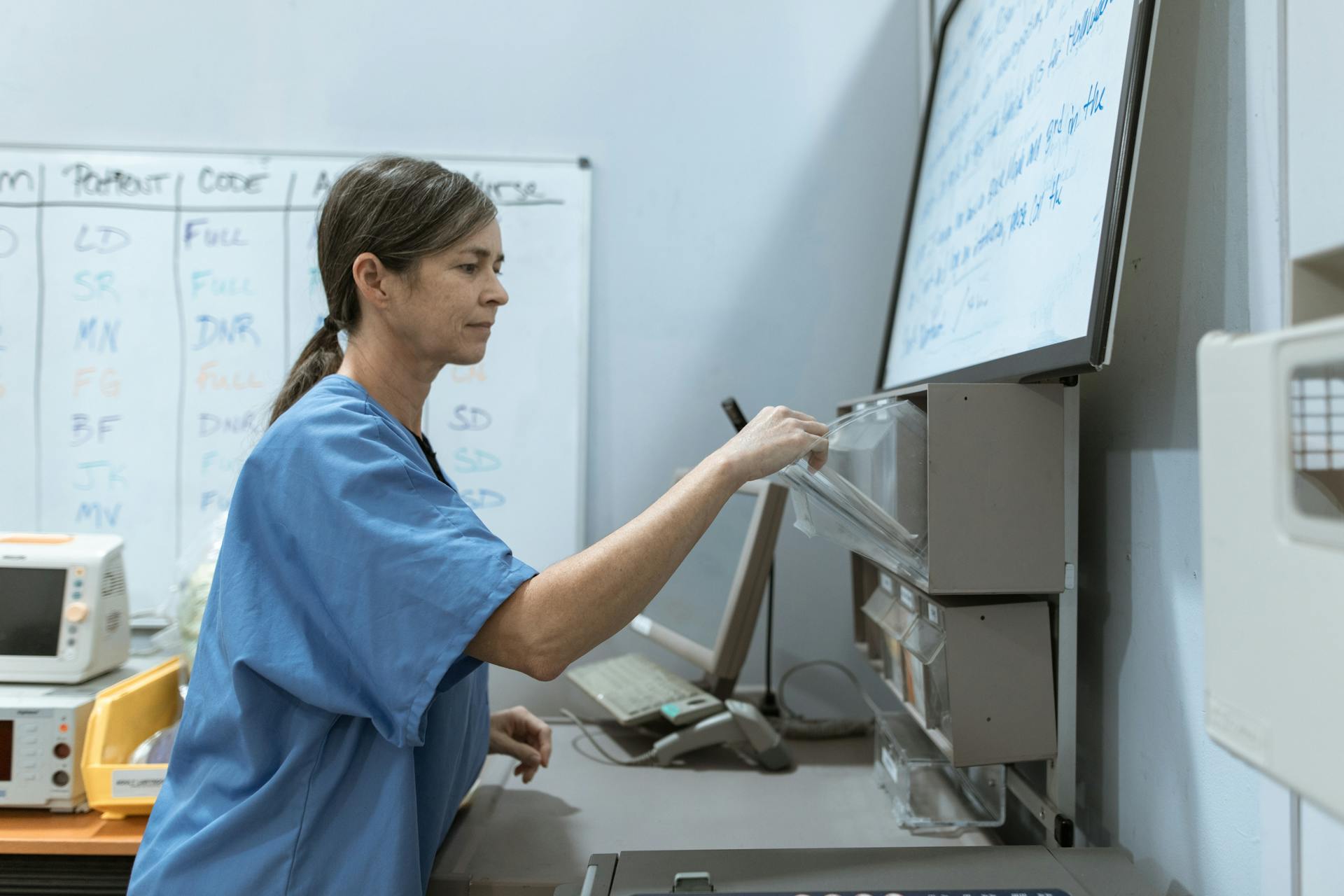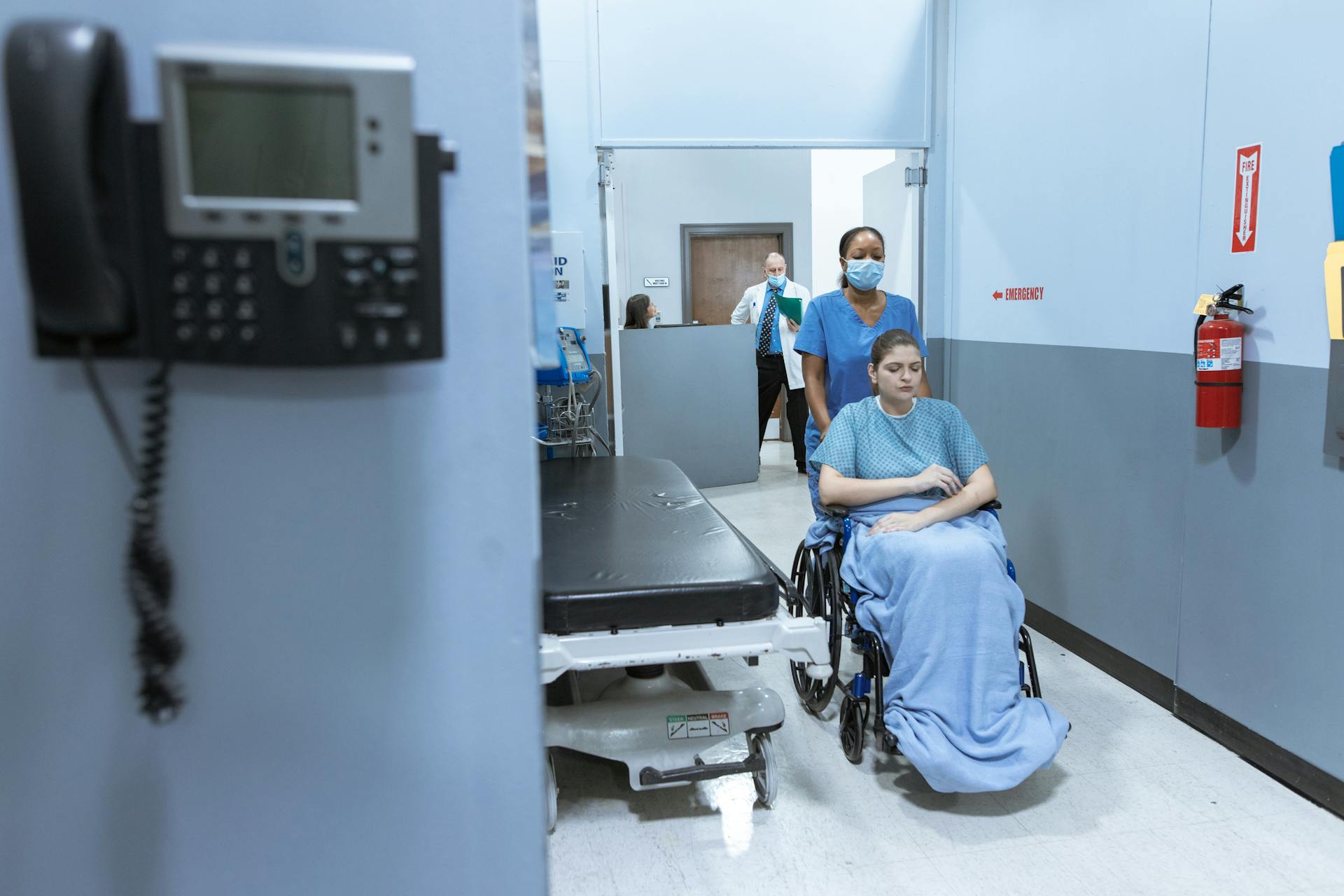
As a nurse practitioner, you're likely no stranger to hard work and dedication. But when it comes to buying a home, navigating the mortgage process can be overwhelming.
Nurse practitioner mortgage loans are designed to help you achieve your dream of homeownership. These specialized loans offer more favorable terms than traditional mortgages, taking into account your unique financial situation as a nurse practitioner.
With a nurse practitioner mortgage loan, you can expect to qualify for a lower interest rate and lower down payment requirements. This can make a big difference in your monthly mortgage payments and overall cost of homeownership.
By choosing a nurse practitioner mortgage loan, you can focus on what matters most - providing quality care to your patients and building a brighter future for yourself and your family.
Readers also liked: Debt Consolidation Loans for Nurses
Nurse Practitioner Mortgage Loans
Nurse Practitioner Mortgage Loans offer low down payment options, ranging from 0% to 10% down, and no private mortgage insurance (PMI), potentially saving thousands of dollars each year. This can be a game-changer for nurse practitioners who may have high student loan debt and limited savings.
These mortgages usually fall within a broader category called a physician mortgage program, but depending on the lender, it might be classified as a professional home loan. Some lenders may not consider registered nurses as qualifying professions.
Nurse practitioner mortgage loans have several perks, including higher loan limits, modified treatment of student loan balances when calculating your debt-to-income ratio, and more lenient income requirements. You can even close on a home before starting a new position, as long as you have a valid employment contract.
Here are some of the key benefits of nurse practitioner mortgage loans:
- Low down payment options (0% to 10% down)
- No private mortgage insurance (PMI)
- Higher loan limits ($647,200 in most parts of the country)
- Modified treatment of student loan balances
- More lenient income requirements
Physician mortgage programs have expanded to include other high-income, high-student debt professions, so it's worth exploring your options even if you're not a traditional candidate.
For another approach, see: High Risk Mortgage Loans
Types of Mortgage Loans
Nurse practitioner mortgage loans can be categorized under a broader category called physician mortgage programs or professional home loans. These programs are designed for high-income, high-student debt professions.
A unique perspective: High Ltv Mortgage Loans

There are several types of mortgage loans that nurse practitioners may be eligible for, including specialty home loan programs. Some lenders offer nurse practitioner mortgage loans, which provide low down payment options and no private mortgage insurance requirement.
These loans usually have low down payment options ranging from 0% to 10% down. No private mortgage insurance (PMI) is required, potentially saving you thousands of dollars each year.
Some key features of these loans include:
- Low down payment options, ranging from 0% to 10% down.
- No PMI, potentially saving you thousands of dollars each year.
Conventional Home Loans
Conventional home loans are a popular option for nurses looking to purchase a home. They can be found through private lenders or government-sponsored entities like Fannie Mae and Freddie Mac.
These loans are not offered or secured by a government entity, but are instead backed by a bank, credit union, or mortgage company. This makes them more widely available than other types of loans.
One advantage of conventional home loans is that they often offer the most advantageous rates and terms. This means you can shop around for the best deal and find a loan that meets your needs.
On a similar theme: Government Assistance Mortgage Loans

Conventional home loans are generally more available than other types of loans, making them a great option to consider. You can find them through a variety of lenders, giving you more choices.
Here are some key facts about conventional home loans:
- Conventional home loans can be found through private lenders or government-sponsored entities like Fannie Mae and Freddie Mac.
- They are not offered or secured by a government entity, but are instead backed by a bank, credit union, or mortgage company.
- Conventional home loans often offer the most advantageous rates and terms.
Types of Mortgage Loans
Nurse practitioner mortgage loans offer 0% to 10% down payment options with no private mortgage insurance requirement.
FHA loans, on the other hand, are government-backed loans that can help increase homeownership in America by reducing credit score requirements for home loans. These loans have a low down payment requirement, and nurse practitioners with a credit score of 580 or higher can qualify for a FHA loan.
Nurse practitioners can also qualify for a FHA loan with a credit score as low as 500, but they'll need to put down up to 10% for a down payment. Additionally, closing costs can sometimes be rolled into the mortgage payment, meaning you'll need to have less money in a lump sum upfront.
Worth a look: 10 Mortgage Loans

Here are some benefits of a FHA loan:
- Nurse Practitioners with a credit score of 580 or higher can qualify for a FHA loan.
- Home buyers can put down as little as 3.5% for a down payment.
- Closing costs can sometimes be rolled into the mortgage payment.
- There is an option to have no down payment.
- The loan terms offer competitive interest rates.
- Credit is flexible, with no minimum credit score.
- Available in common fixed-rate terms like 30-year and 15-year loans.
Overall, nurse practitioner mortgage loans and FHA loans offer attractive benefits for nurse practitioners looking to buy a home.
Physician Loans for Nurses
Nurse practitioners are often treated like doctors when it comes to physician loans, which can be a game-changer for those in the nursing field.
Some lenders recognize that nurses have unique financial situations and offer special mortgage programs that cater to their needs.
These programs can come with higher interest rates or fees, but they also offer more relaxed underwriting criteria, making it easier to qualify for a mortgage.
You can secure a mortgage with a 0% to 10% down payment option and no private mortgage insurance requirement.
Most nurse practitioner mortgage underwriting guidelines will modify or exclude student loan payments from your debt-to-income ratio (DTI) calculation.
This can be a huge help for nurses who have high student loan debt, as it can make it easier to qualify for a mortgage.
On a similar theme: Mortgage Loans for Nurses

Some lenders offer nurse practitioner mortgage loans with more relaxed underwriting criteria, making it easier to qualify for a mortgage than a conventional loan.
These loans can be a great option for early-career nurse practitioners who may not have a lot of money saved up for a down payment.
Here are some key takeaways about nurse practitioner mortgage loans:
- Nurse practitioner mortgage loans offer 0% to 10% down payment options with no private mortgage insurance requirement.
- Most NP mortgage underwriting guidelines will modify or exclude student loan payments from your debt-to-income ratio (DTI) calculation.
Top Lenders and Options
Here's the section on "Top Lenders and Options":
You can find nurse practitioner mortgage loans through several lenders, but they can be hard to find online.
Some top lenders offering nurse practitioner mortgage loans include those listed alphabetically:
Nurse practitioners are often treated like doctors for the purposes of these loans, which means they can secure a mortgage with fewer restrictions than a conventional mortgage.
These lenders offer specialized mortgage programs that cater to the unique financial situations of healthcare professionals, including nurse practitioners.
Physician loans, which are often used by doctors, can come with higher interest rates or higher fees than conventional loans, but it's also possible to refinance them when your situation changes or when rates are more favorable.
Take a look at this: When Health Care Insurers Negotiate Contracts with Healthcare Providers or

Nurse practitioners can explore options like USDA mortgages, which assist approved lenders in providing low- and moderate-income households the opportunity to own a home in eligible rural areas.
The US Department of Agriculture defines eligible areas as those with a population of less than 25,000, and nurse practitioners may be able to take advantage of this program if they meet the income and location requirements.
For more insights, see: Bcbs Hsa Eligible Expenses
Considerations and Alternatives
If you're considering an FHA loan as a nurse practitioner, you'll want to weigh the pros and cons carefully.
FHA loans are government-backed, which means the government will pay the bank for the rest of the loan if you can't pay your mortgage off, and then take ownership of the home. This can be a huge relief for many borrowers.
The low down payment requirement of FHA loans can be a major advantage, especially for nurse practitioners with serious student debt. With a lower down payment needed, you can qualify for a mortgage sooner.
FHA loans also have lower credit score requirements, making them a popular choice for first-time home buyers, including nurse practitioners.
Intriguing read: Government Mortgage Loans for First Time Buyers
Is a Mortgage Loan Right for You?
A mortgage loan can be a game-changer for early- to mid-career healthcare professionals who want to buy a home but may not have the traditional credit history or income to qualify for a loan.
You can score low down payment financing by leveraging your degree, just like nurse practitioners do with nurse practitioner mortgage loans.
These loans can help you avoid PMI, access higher loan limits, and benefit from more flexible underwriting criteria.
For example, nurse practitioner mortgage loans allow you to take advantage of these benefits, making it easier to become a homeowner sooner rather than later.
It's worth exploring these options if you're a healthcare professional looking to buy a home, but be sure to fill out the form to start receiving quotes for nurse practitioner mortgage loans.
Nurses Consider Home Care
As a nurse, you're likely no stranger to hard work and dedication. Nurses Can Consider Homes for Heroes, a program that offers incentives to healthcare professionals to buy or sell a home. Most heroes save at least $3,000 when they work with their network of lenders and real estate professionals.
The Homes for Heroes program is available in most states, and it's worth exploring if you're in the market for a new home. This program claims to have a network of lenders and real estate professionals who can help you save even more money.
A different take: Bcbs Aware Network
Frequently Asked Questions
Can nurses get lower mortgage rates?
Yes, nurses may qualify for lower interest rates on mortgages compared to standard offerings. This can help make homeownership more affordable and accessible to nursing professionals.
Do nurse practitioners qualify for a physician loan?
Yes, nurse practitioners may be eligible for a physician loan, but they must meet all the requirements and other factors such as proof of employment and credit score. Eligibility is determined on a case-by-case basis.
How much debt do you need to be a nurse practitioner?
To become a nurse practitioner, you can expect to take on significant student loan debt, with an average of $184,787. The cost of a DNP program can range from $26,000 to $254,000, making it essential to explore financial aid options and scholarships.
What is a medical professional home loan?
A medical professional home loan, also known as a physician loan, is a mortgage designed for doctors and medical professionals that often doesn't require a down payment. This type of loan can help medical professionals purchase a home with minimal upfront costs.
Sources
- https://www.merchantsbank.com/home-loans/mortgage/medical-professional-loan-program
- https://www.studentloanplanner.com/np-mortgage-loans-nurse-practitioners/
- https://www.whitecoatinvestor.com/best-home-loans-for-nurses/
- https://www.npadvantage.com/2023/04/13/understanding-your-financing-options-as-a-nurse-practitioner/
- https://www.homesforheroes.com/blog/home-loans-for-nurse-practitioners-save-on-closing-costs/
Featured Images: pexels.com


